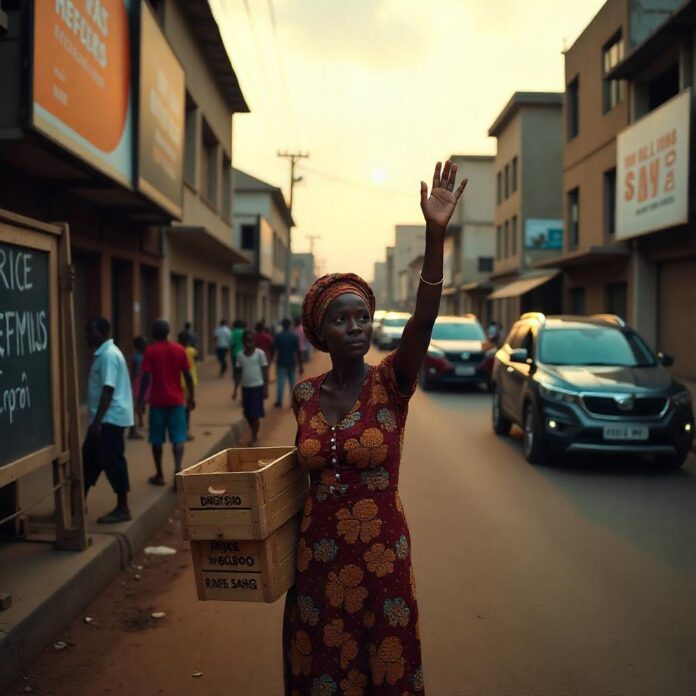The Shocking Ranking
The headline hits like a physical blow: Nigeria, the 12th poorest nation globally by GDP per capita in 2025. With each citizen effectively worth just $807 annually in economic output, Africa’s largest economy now trails conflict-ravaged nations like South Sudan and Yemen. This isn’t just a statistic—it’s a screaming paradox. How does a nation pumping over a million barrels of oil daily, with a total GDP dwarfing most African peers, simultaneously host 87 million citizens below the poverty line? The answer lies in the chasm between elite wealth and mass deprivation. As Abuja teacher Mariam Audu lamented in the shadow of government buildings: “Prices are still high. Salaries haven’t increased. What are they doing with all the money?” Her question hangs heavy over Tinubu’s “reform era”—a time when tax reforms glitter on paper while inflation devours hope in markets.
Nigeria’s Poverty Crisis – By the Numbers
Let’s slice through the abstraction with brutal arithmetic. Nigeria’s $807 per capita income isn’t just low—it’s 18 times below the global average of $14,213. Zoom out further: Africa contributes 19% of humanity but only 3% of the $113 trillion world economy. Our population isn’t our burden; our system is.
Freefalling Livelihoods: Per capita income didn’t just stagnate—it plunged 4.73% from $877 in 2024 to $835.49 in 2025. That’s a year’s worth of meals, school fees, medicines erased from household budgets.
Hunger as Policy Failure: With food inflation at 34.8%, a bag of rice now costs a day’s minimum wage. Result? 5 million Nigerians in acute hunger despite fertile soil and oil billions.
Human Capital Collapse: Nigerian children born today will be just 36% as productive as peers with full healthcare and education. We’re not just poor; we’re engineered for poverty.
Roots of Inequality – Beyond the Headlines
Poverty isn’t accidental here—it’s architected. Consider the oil paradox:
Elite Capture: While millions queue for subsidized noodles, Nigeria’s top 5 billionaires sit on $29.9B—enough to end extreme poverty nationally.
Stolen Generations: Between 1960–2005, $20 trillion bled from public coffers. That’s not corruption; that’s grand larceny spanning generations.
Reform Shock Therapy: 2023’s fuel subsidy removal tripled pump prices overnight. The naira’s deliberate devaluation then spiked import costs, vaporizing savings. Small trader Adebola in Lagos captures it: “My palm oil profits now buy half a bag of garri. What future?”
Tinubu’s Tax Reforms – Relief or Mirage?
Amid this crisis, Tinubu’s tax overhaul promises salvation. The mechanics seem progressive:
Income Tax Exemption: 0% tax under ₦1M/year ($650) targeting low-wage workers
VAT Restructuring: 0% VAT on food, medicine, rent for struggling families
Small Business Relief: No company tax under ₦50M turnover for market traders, SMEs
Corporate Rate Cut: 30% → 25% by 2026 for multinationals
But dig deeper:
The Fine Print: VAT will leap to 12.5% by 2026 on “luxuries”—including mid-range phones and budget airlines. For clerks aspiring to see Accra, that’s hope taxed.
Collection Brutality: “Officials still harass us for ‘permit fees’ despite tax exemptions,” fumes Lagos trader Chidinma. Old ghosts haunt new laws.
North-South Fault Lines: A proposal letting states keep 60% of VAT triggered fury before settling at 30%. Resource wars now wear fiscal masks.
Economist Emmanuel Idenyi’s warning echoes: “Revenue targets tempt officials to over-assess vulnerable businesses”. Reforms without enforcement integrity are performance art.
Inflation, Hunger and the FAAC Windfall
Here’s where data screams louder than speeches. Post-subsidy removal, monthly state allocations surged 50%+ to ₦900B (vs. ₦590B pre-reform). Cumulatively, ₦18.57 trillion flooded state coffers from April 2024–2025. Yet visit any state capital—where are the grain silos? The clinics?
Currency Carnage: The naira’s 30% devaluation means ₦1 billion in 2023 road funds now buys ₦333 million of construction. Inflation isn’t just rising prices; it’s evaporating public ambition.
Agricultural Abandonment: While food inflation starves families, rural electrification crawls—just 5.9 million Nigerians gained power since 2021. No cold storage equals no tomato harvests preserved.
The FAAC Mirage: Despite states swimming in petro-naira, Sokoto still trucks in water. Kano’s hospitals lack paracetamol. Why? Zero citizen tracking of local spending. As funds flow, hunger deepens—a damning disconnect.
Pathways to Inclusive Growth
We need more than GDP poetry. Here’s the radical pragmatism missing from policy suites:
Break the Food-Price Trap: Stabilize the naira not by hoarding dollars, but by backing 1 million smallholder farmers with drought-resistant seeds and micro-irrigation. Women grow 80% of Nigeria’s food—yet own 2% of titled land. Flip that.
Power to the People: Scale the World Bank’s solar success (67MW deployed) nationally. No grid? No excuse. Mini-grids can light up agro-processing hubs in 12 months.
Tax Justice Revolution: Why tax teachers’ ₦50k allowances while yacht imports slide duty-free? Introduce wealth taxes targeting luxury real estate portfolios, offshore asset income, and private jet registrations.
Ghana’s Lesson: They spend 12.8% on health, 18.5% on education of their budget. Nigeria? 3.5% and 6.5%. Human capital isn’t a cost—it’s the only exit ramp.
The Crossroads of Reform
Two Nigerias glare at each other across a chasm. In one: Tinubu’s May 2025 declaration that “the worst is behind us” as tax codes gleam and rig counts rise 400%. In the other: a mother in Kano selling blood to buy millet while state governors pocket ₦8 billion monthly FAAC windfalls.
This isn’t about data—it’s about dignity. As tax expert Nongomin Joshua warns: “Reforms mean little if stolen funds still buy private jets while children starve”. The path forward demands courageous specificity: Publish every FAAC dollar spent. Jail one grand corruptor as an example. Transform VAT exemptions into tangible market price drops.
Nigeria’s tragedy isn’t poverty—it’s pilfered potential. Close the inequality gorge, and we don’t just rise in rankings—we resurrect hope. The blueprint exists. The question remains: Where is the will?


